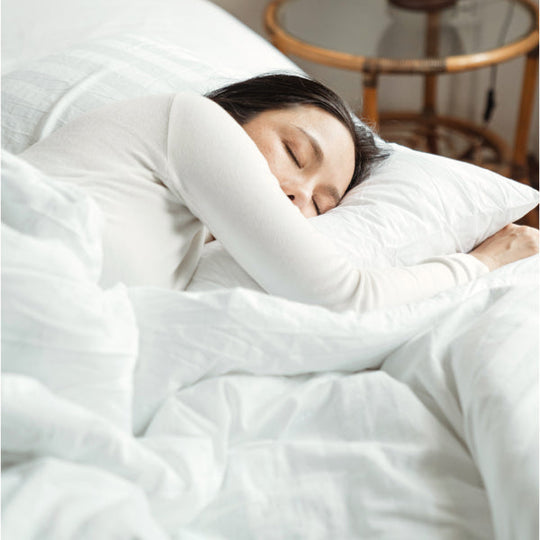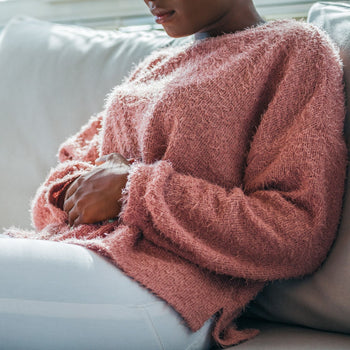Have you recently discovered that your sleep is not as restful as it used to be? Maybe you have difficulties falling asleep—or staying asleep. Maybe you wake up from night sweats, drenched and needing to change your pajamas. You might find yourself awakening too early in the morning with no chance of falling back to sleep. Whatever the problem, the recommended nightly 6 to 7 hours of uninterrupted sleep seem to be just a dream.
More than 50% of women report sleep problems as they progress through the menopausal transition, experiencing insomnia and night sweats. Almost 1 in 10 postmenopausal women have sleep apnea, a potentially serious disorder. 1 in 4 menopausal women reports sleep problems severe enough to interfere with daytime functioning because they’re feeling fatigued or experiencing brain fog.
Many factors can contribute to sleep issues, some related to peri-menopause and menopause, and others related to aging or illness. Here, we’re addressing only the reasons related to the hormonal fluctuations of the menopausal transition. These generally begin in your early 40s, when your ovaries (and other organs) start to produce lower levels of estrogen and progesterone. This decline in estrogen leads to higher levels of follicle-stimulating hormone (FSH). Throughout your reproductive years, as estrogen levels diminish, FSH levels rise to stimulate your ovaries to release another egg (follicle). As you enter menopause and you produce less estrogen, you eventually stop ovulating, causing your FSH levels to remain elevated. In fact, sustained high FSH levels are often used to confirm a woman has reached menopause.
The changes in these particular hormone levels have all been linked to poor sleep quality and a greater risk of frequent night-time awakenings. Growing evidence suggests fluctuations in estrogen levels, common during perimenopause, also trigger changes in your brain that may contribute to (or possibly cause) sleep problems. In addition, declining estrogen levels affect the body’s ability to use and absorb magnesium, a mineral that helps your muscles relax; low magnesium levels have been linked to insomnia.
Here Are 11 Tips to Help You Get Your ZZZ's Back:
-
Don’t eat large meals before bedtime. Avoid spicy or acidic foods because they can trigger a hot flash.
-
Avoid smoking, caffeine, and alcohol—especially before bedtime. Want to enjoy a glass of wine without the side effects? Try Dry Farm Wines - they offer a sugar-free, organic, and low-sulfite wine selection so you can enjoy a glass without feeling the effects afterwards!
-
Exercise to maintain a healthy weight—but don’t exercise at least two hours before you hit the hay. Looking for exercise tips? Here’s a few from a fellow Kindra community member.
-
Try to get direct sunlight for vitamin D.
-
Use a fan or air conditioner to increase air flow and cool the bedroom.
-
Keep the bedroom dark at night.
-
Sleep in a lightweight fabric like cotton or one that wicks away your sweat and avoid heavy blankets.
-
Establish and keep to a sleep schedule—even on the weekends.
-
If you awaken and cannot fall back to sleep after 20 minutes, leave the bed to do something relaxing until you feel sleepy.
-
Find ways to help reduce stress: meditation, yoga, deep breathing, massage, or a warm bath or shower before bed.
-
Add the MenoRelief Supplement to your self-care regimen. Formulated specifically for menopause, this 100% natural supplement contains clinically-studied ingredients Pycnogenol and Ashwagandha for hot flash, night sweat, and stress relief.
MenoRelief
You don’t have to yawn your way through your 40's and 50's. Get the help you need now to put you on the road to recovering your ZZZ’s.
Continue the Conversation
Leave a Reply
Tags: About Menopause Anxious body Connection Fatigue Foggy & Unfocused Hot flashes Managing my Hormones Mental Well-Being Moody & Irritable Physical Well-Being Sad sleep problems sleeping Stressed Trouble Sleeping Weight Gain















Love the information about menopause.
Thank you so much.
— Blanca Taylor
Hello ourkindra.com administrator, Your posts are always well-cited and reliable.
— Maximilian Klem